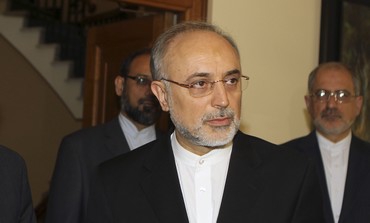
Iranian and Sudanese foreign ministers meet, Sudan vows to obtain "advanced" weapons to answer Israeli strikes.
Iran�s foreign minister, Ali Akbar Salehi, met with Sudanese State Minister for Foreign Affairs Salah Wansi late Monday night to discuss strengthening bilateral ties, Iranian state media reported on Tuesday.
Salehi held brief talks with Wansi during an overnight stop in Khartoum, according to the Iranian Student�s News Agency (ISNA).
Iranian reports said the two foreign ministers discussed ways to expand ties and also talked about developments in the region.
Although the brief reports did not mention whether the two senior officials touched on security matters during their talks, Iran�s decision to publish the discussions in its state press could indicate that Tehran intends to expand its military and security ties to Sudan.
The reports come a week after Sudan�s president Omar al-Bashir said that Khartoum would seek to acquire �advanced weaponry� to counter �repeated Israeli attacks,� following allegations by Khartoum that Israel had conducted an air strike against its Yarmouk military complex in late October.
Echoing Tehran�s terminology and rhetoric, the Sudanese leader said that Israel was �the Zionist enemy and Israel will remain the enemy,� Sudanese news sources reported.
Israel has neither confirmed nor denied striking the Yarmouk complex but following the accusations, Israeli officials charged that Sudan and Iran are working together to smuggle arms to the Hamas-controlled Gaza Strip via Egypt.
Following the Yarmouk incident, Tehran denied that it was linked to the Sudanese military complex, but two days later dispatched two warships to Port Sudan, saying that the vessels were on a �routine visit.�
In comments earlier this month, however, Iranian foreign minister Salehi may have hinted that Tehran has a presence in Sudan when he said that it was �normal� for governments to purchase weapons from each other.
�Let�s assume that Iran has established an arms factory in Sudan, is this forbidden? This sort of trade exists between countries... Within the framework of international laws, if there is a country that wants to buy weapons from us we are ready,� Salehi said in an extensive interview with Qatari newspaper al-Watan.
While Tehran has not admitted a military alliance with Sudan, it has repeatedly emphasized Sudan�s importance to its power nexus. Earlier this month, Iranian interior minister and former defense minister Mostafa Mohammad- Najjar dubbed Sudan the �pivot of Iran-Africa relations.�
When Iran�s president Mahmoud Ahmadinejad visited Sudan last year, he said the two countries planned to boost bilateral relations, and that Tehran and Khartoum would stand together as �defenders of Islam.�
Sudan, for its part, has vehemently denied that it has any kind of military alliance with the Islamic Republic. Last week, State Minister at the Presidency of the Republic Ameen Hassan Omar said Sudan was �outside the Iranian axis,� Gulf News reported.
However, according to US Sudan scholar and former Special Envoy to Sudan Andrew S. Natsios, after Bashir took power in an Islamist-backed military coup in 1989, Sudan�s new regime approached Iran to form a Sunni-Shi�ite alliance, based on a shared Islamist ideology.
Intelligence analysts at the US-based Soufan Group also say that Tehran sent weapons and oil supplies to Bashir�s new Islamist regime after the 1989 coup and that advisers from Iran�s Revolutionary Guard Corps (IRGC) traveled to Sudan to train the country�s internal security forces.
Writing in a US magazine recently, Natsios said that two decades ago Sudan and Iran signed an agreement granting the Iranian navy unlimited access to Sudan�s major Red Sea port, Port Sudan.
According to Natsios, Iran is also using Sudan as a platform for its intelligence operations in Africa.
Anti-Bashir rebels in Sudan have accused Iran of supplying regime forces with weapons, including land mines, drones and Shebab-3 rockets.
In March, the Sudan Peoples Liberation Movement North said rebels had shot down an Iranian-made drone over the Nuba mountains.
Sudan�s Islamist opposition party, the Popular Congress Party (PCP) have also alleged that the IRGC built a weapons factory in Khartoum, in a May 2010 report published in the PCP-affiliated newspaper Ra�y al-Sha�b. The report, which alleged that the Qods Force built an arms factory as part of a military agreement signed in March 2008 by Iran�s then defense minister Mohammad- Najjar, alleged that the Iranian factory supplied arms to Hamas. The paper was immediately suspended and three of its journalists arrested.The IRGC�s elite extraterritorial unit the Qods Force is also believed to have operated a training camp in Sudan, according to a report by Washington, D.C.-based Center for Strategic and International Studies.
This month, Iran�s ruling National Congress Party (NCP) said the PCP was complicit in the alleged October Israeli air strike on the Yarmouk complex, arguing that Israeli officials had made the decision to strike Yarmouk based on the Ra�y al-Sha�b report.
Prior to the alleged air strike last month, Sudan has blamed Israel for several other attacks apparently related to the smuggling of Iranian arms to the Hamas-controlled Gaza Strip.
In January 2009, Sudan accused Israel of striking a convoy in east Sudan, which was reportedly carrying Iranian Fajr-3 rockets en-route to Gaza. In May, Sudan�s foreign minister said Israel was responsible for an air strike on a four-by-four vehicle in Port Sudan that killed two people, including a prominent businessman, Nasir Awad Ahmad Saed, whom locals said was a �well known arms dealer and weapons smuggler.�
In April, UAE newspaper al- Khaleej quoted Sudanese president Bashir as acknowledging the presence of organized weapons smuggling operations from Sudan to Egypt, and saying that there was no way to stop it.
On Monday, pan-Arab news outlet al-Arabiya reported on a recent study on the situation Sinai by Palestinian expert Dr.�Samir Ghattas, who said that the Qods Force, the extraterritorial arm of Iran�s Revolutionary Guard Corps (IRGC) are involved in weapons smuggling to Egypt from Sudan and Libya.
�Enormous quantities� of smuggled weapons flow through Sinai, al-Arabiya reported Ghattas as saying.
The Iran Project is not responsible for the content of quoted articles.











